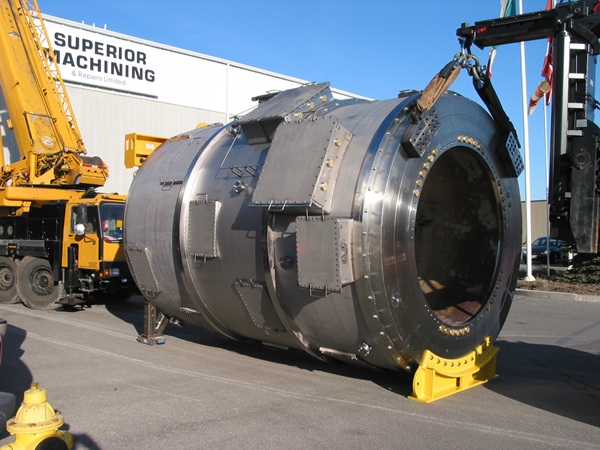The Importance of
Machining

Machining is defined as the use
of various processes to alter a material from its original state to a desirable
shape and size. The processes used for machining work to remove material from
the object in a controlled manner in order to achieve the desired size and
shape. Some of the more common types of machining processes include the
following:
-
Turning
-
Boring
-
Milling
-
Drilling
-
Grinding
Machining typically refers to
the alteration of metal products, but it is also commonly used on plastics,
wood and other composite materials.
Fabrication is
the process of creating a product from either raw or semi-refined materials.
Products that are fabricated will generally require at least one or more
type(s) of machining process in order to be "finished”. For this reason
machining is typically grouped together with the other processes that are
necessary to complete fabrication.
Large Machining Special
Requirements
Large machining is also known as
heavy machining because these components are very heavy due to their size. The
ability to handle large machining projects is often one of the most limiting
factors for many machine shops. The size of the components demands that bigger
machines be used and there is adequate space available.
The fact that the components are
large may make it seem like there would be more room for error when completing
the machining processes but this is simply not the case. Large machining
projects are subject to the same intense requirements for tight tolerance and
high quality as small or medium machining components. This means that the
machines not only have to be larger, but they must be run by machinists with
the experience and skill necessary to meet these requirements. Strict quality
control standards are essential to guaranteeing consistent quality.
Computer Numerical
Controlled (CNC) machines are most commonly used to consistently produce
the best results. These machines use the latest in technology and methods to
automate the machining processes. The machines run using a computer program
that reduces the need for constant supervision while increasing the quality of
the products. This is especially useful when there is a need for intricate and
detailed machining work because these machines can perform this type of work
virtually flawlessly. CNC machines are also imperative for larger volume
production due to the minimal deviations that are possible.
Addressing Your Large
Machining Needs
Large machining has unique
requirements that will limit the number of
machine shops that are able to
handle the project. Take the time to find a machining company with the
equipment and highly skilled personnel necessary to handle custom machining
needs as well as high volume production.
Ensure that the company you
trust with your business is able to deliver expert results with a strict
quality control regiment in place. It is also beneficial to find a machining
company that is able to offer other high quality services such as welding and
fabrication to provide fully finished products. This can save valuable time
when production is on strict guidelines.
Trust your large machining needs
to a machining company with a solid reputation of service and high quality
products. Find the best large machining company today.